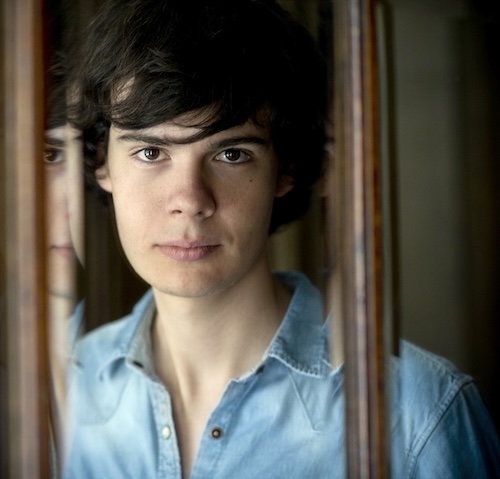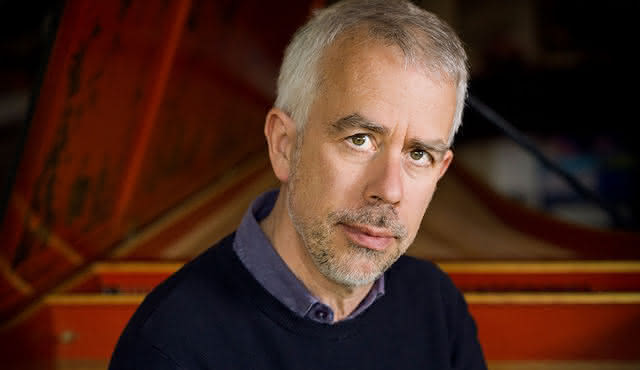A harpsichord festival grows in Washington, courtesy of Capriccio Baroque

Carolyn Winter founded Capriccio Baroque in 2017, splitting off the harpsichord-centered series from a home concert endeavor she directed with Jessica Honigberg in Northwest Washington.
This week Winter will realize a long-held dream: to host a multi-concert festival devoted to the harpsichord. Starting Friday and running through November 19, three eminent French harpsichordists—Justin Taylor, Pierre Hantaï, and Christophe Rousset—will play concerts at the French Embassy (a fourth concert by Hantaï will take place at Church of the Epiphany).
A harpsichord collector who also plays them in an amateur capacity, Winter focused her efforts on historical keyboard concerts, mostly of baroque music performed before a small number of listeners. At first Winter continued to present concerts in her home, but Capriccio Baroque now hosts events in smaller venues around the city.
The genesis of Capriccio Baroque came about because Winter rarely heard the harpsichord in the Washington area, apart from occasional concerts at the Library of Congress or elsewhere. “When you did hear it, it was usually as part of an ensemble, where it was fundamental but you didn’t necessarily hear it,” she added. “You didn’t hear the solo harpsichord repertoire, which is so extensive and incredibly beautiful. So I thought there was a huge gap there.”
Justin Taylor will open “Festival Capriccio 2024” with a concert revisiting the theme of J.S. Bach’s music in the Italian style. “I just released an album called Bach in Italy,” the young French harpsichordist explained. “I wanted to explore the Italian roots in Bach’s music.” He started with transcriptions Bach made from the music of Vivaldi and Marcello and other Venetian composers.
“It’s quite moving for me to imagine Bach, who was maybe 23 or 24 years old, discovering Vivaldi’s music through the publication of L’estro armonico,” he explained. “Twenty years later, in 1735, he decided to write his own Italian Concerto, not a transcription this time. So it shows how this style had been following his writing all his life.” Alpha released Taylor’s recording on this theme last year.
Taylor played an early version of the program at his most recent recital for Capriccio Baroque, in 2023, recording the album shortly afterward. For this new version of the program, he has added some keyboard pieces by Italian composers, including Alessandro and Domenico Scarlatti, Benedetto Marcello, and one Antonio Valente.
“The idea was to be a bit in Bach’s head when he discovered this music,” he said. “He may have sight-read some toccatas by Alessandro Scarlatti and others a bit earlier than Vivaldi. It’s incredible how without even traveling to Venice, he is somehow the most Venetian composer of this time. Adding pieces by other composers was a way to understand this.”
Taylor has even tried his own hand at a transcription, making his own keyboard version of the C major slow movement from a Vivaldi Flautino Concerto. “When you are doing your own transcription of a piece that you love,” he said, “it’s maybe even more personal. I had to adapt quite a few things to play it at the keyboard, as far as harmonies in the left hand and how to sing the melody the same way a recorder would sing. It makes this piece very personal for me, and it’s still very close to my heart.”
Taylor has visited Washington a few times this year, playing with Opera Lafayette and with his chamber group, Le Consort, at the Library of Congress. “I really love this city,” he admitted, not least for the discoveries he made researching his upcoming recording project, devoted to the harpsichordist Wanda Landowska, including some little piano pieces she wrote as a teenager.
Taylor also plays the piano and is currently working on a Chopin recording, but he feels a special love for the harpsichord, which he is hoping to share with audiences at the Festival Capriccio. “What I really love about the harpsichord,” he said, “is the intimacy the player has with the string, which is plucked, not hammered like the piano. When you play piano, it’s dealing with the weight of your arm, your wrist, and putting a lot of energy into the keyboard and trying to make the piano sing and have a large sound.”
“When you play harpsichord,” he continued, “you can really feel the string, which is plucked by your finger more or less. Playing piano or organ, there are so many intermediaries and a lot of mechanics between your finger and the sound produced. With the harpsichord, I have the feeling that the path is very short and you can feel this. And I think for the audience, it’s the same.”

The middle part of the festival will feature two concerts by Pierre Hantaï, who spoke to WCR while he was in Washington to play a recital this summer. An éminence grise of the harpsichord, he has visited Washington many times over the last couple decades, sometimes with his brothers, Marc and Jérôme, who are both early music specialists as well.
While he has come to know a lot more about harpsichords, including the few original instruments that he calls the “Stradivarii” of harpsichords, it was really the music that drew him to the instrument at first, particularly the music of Bach. “It was clear to me that the harpsichord was the right instrument for Bach. The instrument teaches you something, if you play the right instrument for music in that style, the instrument shows you the way.”
At his June recital, Hantaï decided during the concert what pieces to play and in what order. He also requested that almost all the lights be turned off, both recently adopted practices for him. “I didn’t feel well in concerts, and I didn’t know why,” he explained. Darkness helps the audience focus on him and on the music, and he feels that not announcing the program is nearer to the origins of the keyboard recital, with Liszt. “It is closer to a jazz concert,” he says. “If you go to any kind of concert, jazz or rock, you cannot imagine having a program in your hand.”
“I also don’t like to know exactly what I will play,” he added. “I always have too much music. At this concert, I had a number of preludes. Sometimes I have some choices, and I ask the audience which one I should play. I think the source of the problem is in the conservatories, because you learn music and you have to do your exam three months later. You have to play certain pieces, and people will judge you and you shouldn’t be too personal. It starts like this, and then you play international competitions and it gets worse.”
Nonetheless, the harpsichordist divulged some details about the two concerts he will play for the Festival Capriccio. One program will consist of music by Handel and Domenico Scarlatti, and the other will be devoted to Bach’s Goldberg Variations. The latter is a piece that he used to play much more often, he said: “When I made a recording of it, I played more than a hundred performances.”
He doesn’t think that his approach to such a famous work has changed at all over the years. “I changed, and my playing changed,” he clarified. “There is always the question of the harpsichord staying in tune, because it’s over an hour of playing. So I play half an hour of other music and then take an intermission. Then I start the Goldberg, when the audience has been there, the room is settled, and the harpsichord can be retuned if it needs it. The audience can focus.”
When asked about why listeners need to know about the harpsichord, Hantaï quipped, “I don’t think the audience needs the harpsichord.” Then he added in a more serious vein: “It’s more a question of music. The best thing that a man did on earth, since the beginning, was the music of Bach. Many of his masterworks are for the harpsichord, and so that’s the best reason. And that’s why I play concerts, I think. I love to play music, but now that I’m getting older, I feel that it’s – well, not a mission exactly – but it’s so important. For civilization.”
He thinks for a time, searching for the right words. “It’s important to be a bit more fidèle” (faithful) “to such important things. They have to stay alive as long as possible.”
But we know that that’s not true: this music may not endure, after all, without people to play and listen to it. “That is why I serve this music, which is very famous, but at the same time people don’t know it so well. And now the best harpsichord players in the world come to Washington, because of Carolyn.” And Capriccio Baroque.
Festival Capriccio runs from October 25 to November 19. capricciobaroque.org